I talked to Richie McCaffery about his first collection ‘Cairn’ (Nine Arches Press).
PART ONE: THE POET
Paul: Where did you grow up?
Richie: I was born in Newcastle (in the Princess Mary Hospital, to be exact) and raised for the first four years of my life in Gateshead, where my family hails from. Dad took a job with British Coal which brought us to Northumberland and we settled in the little village of Warkworth, where my parents still live in the same house, overlooking the castle. It’s a charming place, but it’s lost quite a lot of its magic to the second-home market and to tourism (most of the historic high street is now holiday lets).
Paul: So, are you English or Scottish or a bit of both?
Richie: Well, I definitely have Geordie vestiges to my speech, if you hear me talk. But many people assume I’m Scottish, perhaps because I’ve spent a lot of my adult life in Scotland and did a PhD in Scottish literature. I certainly align myself spiritually and politically far more readily with Scotland (case in point, the way Scotland voted in the Brexit debacle). I have a poem where I play on this idea that in the English language you can add an ‘ish’ suffix to a word to make it imply that something almost is, or you can use ‘ish’ itself to mean nearly (what time is it? Ten-ish…). Well, in my poem I don’t see why that can’t be applied to nationality – I’m half-heartedly Engl-ish and I’d rather be Scott-ish, so I’m stuck in a gap between the two. It’s a big topic and one that gets me quite riled, how reductive and essentialist some people’s definition of nationality is. But let’s not get into that – I’ll just say that in the past Northumberland was disputed territory between Scotland and England and that I consider myself part of ‘Scotia Irredenta’ – unredeemed Scotland.
Paul: Where are you based now and how did you come to be there?
Richie: Well, again I am torn between two countries: Scotland and Belgium. I married a Flemish woman (Stef) who I met while I was an undergraduate at Stirling University. We lived for many years in various parts of Scotland before deciding that it was time for Stef to return to Belgium for a trial run at living there once again, after the best part of nearly twenty years away. We settled in Ghent, which I think is (alongside Antwerp) one of the jewel cities of Flanders. Bruges is too ossified and saccharine and Brussels is its own state. Like Bruges, Ghent is built on many waterways and has so much intact medieval architecture but it also has a pulse to it that sleepy Bruges-la-morte for me lacks.
Paul: What’s the city like as a place to live? What are the pros and cons?
Richie: I think I’ve partially answered your question in my reply above. I don’t buy into the whole town vs. country binary – I think both are uniquely rewarding and galling in equal measure but they are both important. I wonder if I’ll always be an interstitial creature – caught between two places. I was reading something about the Soho habitué Daniel Farson recently where he said that he loved living in the relative peace and quiet in the country and then launching occasional boozy ‘raids’ on London, I quite like the sound of that. There is something in the Samuel Johnson cliché that ‘he who tires of London [or the city in general] tires of life itself’. But I also see the other aspect, the whole James (B. V.) Thomson nightmare hangover of the ‘City of Dreadful Night’, as a place of rejection and alienation. I like the relative anonymity of life in the city and I love flaneuring around – just going for long walks to find out more of its secrets. For instance, there’s an ancient street in Ghent where the city conservatoire is, and every time I go past I hear the musicians tuning up or practicing – I love that. That things are going on around you and you are very far from the centre of the action.
Paul: I imagine it’s very good for Flemish poetry and that there is a strong poetry scene. Is that so?
Richie: I’m afraid I’m not really the man to ask about the state of Flemish poetry – my grasp of Flemish is very shaky (I can speak it to the level of a four-, maybe five-year old child). I read reams of it in translation when I can find it. There is certainly a very strong poetry and drama scene in Ghent and it’s home to a number of celebrated authors – Hugo Claus lived there, I see Herman Brusselmans in the street quite often and Stefan Hertmans has a longstanding connection to the city, not to mention it being the birthplace of Nobel Laureate Maurice Maeterlinck. The big poetry asset that Ghent has is the Poeziecentrum, which is fundamentally the same thing as the Scottish Poetry Library or the Poetry Library in London. It’s housed in an old, turreted building on the corner of one of the busiest public spaces in Ghent – the Vrijdagsmarkt. Here you can find anything, provided it’s related to poetry in Belgium.
Paul: When did you start reading poetry? Who did you first read?
Richie: I was (still am!) very academically dull – never really stood out in anything and then around about the age of 14 or so I took a test (can’t remember the name of it) but it was designed to measure the aptitude of each pupil and the likely grade that they were on track to get after doing their GCSEs. Well, I completely flunked my English one. There I was sitting in the top set in English and they were talking about maybe moving me down to another level. It really horrified me and spurred me into action. I decided that I was going to do my best in English and from that moment on I read voraciously. By 15 I was in a different class with a much more inspiring teacher (Mary Adams) and she got me into the canonical names – mostly male I’m afraid – Heaney, Hughes, and I became obsessed with Thom Gunn for some reason. I remember reading Doris Lessing’s short story ‘Flight’ as part of the GCSE syllabus and I found the effect of the story, its emotions and the mot-juste-ness of the words absolutely intoxicating (you must look up on Youtube the footage of Doris Lessing being told she’s won the Nobel Prize!).
It’s definitely the right time to be spell-bound by poetry and writing, when you are a teenager with a head full of fractious hormones – it makes things and experiences spine-tingling. I wish I still had that! Anyway, I devoted myself to English and to poetry at school to the detriment of all my other subjects, but it meant that when the marks were awarded for GCSE examinations, not only did I get a A* in English, but I also received a letter of congratulations from the exam board on scoring one of the top five marks out of quarter of a million other students that particular year. It was certainly my proudest moment – it made me almost vertiginous to think that I’d done better than most of the pupils in all the major public schools like Winchester, Harrow, Eton, etc.
Paul: What about writing poetry?
Richie: The reading and writing of poetry went hand in hand and were contemporaneous. Almost as soon as I had found poems that worked their magic on me, I wanted to know how to wrestle words into that sort of order to create a similar effect. Of course, what I wrote was turgid bilge, but my teacher encouraged me. I remember being told my poems of this time were very ‘pantheistic’ – that I saw a life-force and a spiritual presence in everything. In reality, I was word-drunk and rather taken by the whole Dylan Thomas bardic thing where the sound of the words was more important than the thoughts they conveyed.
It took me a long time to build up the courage to show a poem to my parents, and I was expecting them to laugh at me, when they were genuinely impressed that I’d been devoting my spare time to writing poems, I saw that as a huge green light. An uncle managed to get a poem of mine in the local Chronicle and a year or so later I had a poem highly commended in a competition run by Harry Chambers and his Peterloo Poets – it should be stressed how much of a selfless encourager Chambers was, I was 17 and being told something I had written was good and being given a cheque for (I think) £100. I don’t attach any value at all to poetry prizes now, but then that was profoundly validating.
Paul: What did you study at university?
Richie: Ach, my experience of going to university was not so jolly or auspicious. The pattern I described above of focussing on English to the detriment of all other subjects continued into my A-Levels. Only now, I had this divine sense that English was the only subject worth my time (ah, hubris of youth!). Although I was being interviewed for Oxford, I knew myself that when the grades came in, I’d never get into such a place. I remember my interview at New College being utterly traumatic – lower middle class life and a staunchly comprehensive education doesn’t quite provide you with all of the class keys and apparatus you need for such situations. My accent was barely understood, I was scared into inarticulacy, the fright and flight mode kicked in.
The worst interview (not sure if I’m allowed to say this?) was with a certain Martian School poet, who went out of his way to make me squirm and feel unwelcome. I remember him asking my opinion on various canonical books and nodding occasionally but mostly challenging me and then blurting out questions like ‘What’s a dactyl, what’s a spondee?’ Needless to say I fled Oxford and a few days later the letter with a resounding ‘No’ came through the door in Warkworth. So into clearing I went and I eventually got offered a place at Stirling University, on the English Studies course. It was all a blessing in disguise because I met Stef and I had some outstanding teachers – Professor Roderick ‘Rory’ Watson (and through Rory I go to know retired Professor Alasdair Macrae, friend of Sorley MacLean, Iain Crichton Smith, Seamus Heaney), Dr. Chris Powici, Professor Angela Smith et al. It was a beautiful campus (its one main trading point) and I was there just before middle-management took over the place and strip-mined it of the old residual 1960s / 1970s idealism hanging around the halls.
Paul: And you did an MA and PhD. Can you tell me a little about these?
Richie: Rory Watson, who I mentioned above, put together an MLitt course in Modern Scottish Writing with (I think) Scott Hames, which was the last thing Rory supervised before his retirement. At some point midway through my BA I’d come across the early cosmic lyrics in Scots of Hugh MacDiarmid and I set about trying to understand them. When I thought I did, I was amazed by them and MacDiarmid triggered my fascination with the Scottish Literary Renaissance that continues to this day. I remember picking up a copy of Sydney Goodsir Smith’s legendary poem sequence ‘Under the Eildon Tree’ and not understanding a single line of it and again the sense of the challenge of comprehension fired me up.
I ended up writing an MLitt thesis on this very book, which was eventually published in shortened form in Scottish Literary Review. After my MLitt I had what seemed at the time an interminable and often intolerable two years in the ‘real world’ where I tried to find work. It was all work of the most menial kind (often temping), if I could find it at all, and I was unemployed for six months at which point I was forced into an unemployment scheme. The purpose of these schemes is to enable the government to massage unemployment statistics. What happens is you are put into guaranteed work for 6 months invariably without any prospect of permanent employment – the host employer gets free labour.
At the end of my time, the council realised I was the only unemployed person on their books with two first class university degrees, so they created another six month placement for me, working on a study of the impact of the very programme I’d been a part of. It was utterly Kafkaesque and I don’t think the study I wrote has ever been read at all. At this time I was getting more and more depressed and all I wanted to do was go back into a setting in which I mattered, so I tried to apply for a PhD. A number of people were very encouraging but a few also told me I stood more or less no chance of getting the ever elusive funding. I applied to AHRC and Carnegie Trust and got a resounding ‘No’ from AHRC. It was a blow and I briefly flirted with the idea of doing myself in, but the day after that I got another letter, this time from Carnegie. My hands were trembling as I opened the letter, but it was good news, I’d been granted a full scholarship. Provided I worked hard, the next three years of my life were sorted. I did my PhD at the University of Glasgow under Professor Alan Riach and my thesis was on the Scottish poets of World War Two.
Paul: Did you publish your thesis?
Richie: No. A number of reasons why, including a fairly traumatic viva in which I was reminded of one of the uglier aspects of Scottish literature as an academic discipline – the sheer dog-in-a-manger-ish and rather proprietorial attitudes of the small band of scholars in the field. But what I have done is to try and publish long articles culled from each of my chapters. I’ve already published a handful, including one just out on Tom Scott at Studies in Scottish Literature and there’s one on Hugh MacDiarmid’s poetry of World War Two that I’ve just finished the corrections to which I hope will be published later this year.
Paul: Have particular poets/tutors been important in developing your writing?
Richie: In terms of tutors: my high school English teacher Mary Adams, my good friend and tutor Chris Powici, Professor Roderick Watson, Professor Alan Riach. These people have mostly helped me with academic writing and prose, but Chris and Mary Adams were crucial in helping me with my own poetry. Matthew Stewart has been a stalwart supporter and editor of my work and I used to regularly meet up (when I was a PhD student) with the late great Sandy Hutchison (every week, a coffee and a chat in Tinderbox). He read my work and also provided me with a blurb which I treasure and hope to use for my second collection. My family also, particularly my mother, and Stef, who gets to see all my first drafts (and never grumbles about it!).
Paul: Which poets do you regularly go back to?
Richie: Yikes, that’s hard. There are two different camps for me – there are poets I read out of admiration because their aesthetic is so different to mine (Sorley MacLean or Sydney Goodsir Smith, for instance) and then there are poets I read out of admiration and sometimes a sense of envy, or desire for emulation. When I started out I was obsessed with the tight-lipped brilliantly laconic lyrics of Ian Hamilton, but I don’t find myself returning to him that often these days. I’m always floored by Jack Gilbert’s poems and my favourite Dutch poet in translation is Rutger Kopland (by a long chalk) my favourite Belgian is Herman de Coninck. It’s really difficult and quite invidious to just name a few names, when I’m reading so many poets but I will say that it regularly happens that I read a collection and am a bit jealous that I didn’t come up with a certain idea or turn of phrase. I see other poets have that too, like Michael Longley who has a poem subtitled ‘After Hugo Claus’ which uses exactly the same ‘punch-line’ ending where a field from WW1 is so battle-scarred the butter made from the milk of the cows grazing on it ‘tastes like poppies’.
Paul: You published a first pamphlet ‘Spinning Plates‘ in 2012 (HappenStance Press). Could you talk a little about the poems and how you put it together?
Richie: Some of the poems had a long gestation period, others didn’t. Strangely enough the title poem was one of those gifts from where’s unknown – it seems to come out of nowhere. I started writing poetry in earnest I think in my second year at university (2006-2007). My first year was spent writing a dreadful undergraduate novel and writing lots of songs (I’m a keen guitar player). However, when poetry started to take over I found myself incapable of writing songs and I’ve not written a song for over a decade. I think I first approached Nell [Helena Nelson] in perhaps 2010? I got a very encouraging knock-back from her – along the lines of ‘these aren’t ready but I’d like to see more when you have them…’. I’m sure I made lots of gaffes too in my original cover letter, ‘Dear Editor’ instead of ‘Dear Helena Nelson’, that sort of thing. But I did have a couple of HappenStance publications and I knew I wanted something similar for my own work.
Paul: What editorial input did Helena Nelson have?
Richie: A huge input – to the point where people argue that ‘The Waste Land’ is also Ezra Pound’s poem, sort of level of input. I remember lots of letters and emails back and forth about details on poems, suggested revisions etc. Nell is an extremely proactive editor, not someone who decides they like your work and passively accepts everything they are given. Jane Commane at Nine Arches Press is from a very similar school of poetry editing as Nell, and I’m very grateful for that and to be able to work with them.
Paul: How was the pamphlet received?
Richie: It was overwhelmingly positive and I was actually startled by how well-disposed people were in the main to it. But I’m the sort of person who could be given ten glowing reviews and be upset by one negative one – I often don’t see things in the right perspective. I remember one young critic saying I deserved an award for bad writing about sex which miffed me at the time but in retrospect was a very fair criticism. There was only one review that stung me a little and it was written by a friend, so I won’t go into detail.
Paul: And then you had a stunning second pamphlet ‘Ballast Flint‘ in 2013 (Small Press Publishing for the Cromarty Arts Trust) with poems alongside artwork by Hannah Rye. How did this come about?
Richie: Glad you mentioned that, because it was so quickly forgotten after publication. Whereas ‘Spinning Plates’ was about 4 or 5 years in the making, ‘Ballast Flint’ was written in a fever in two weeks. This was during my lost years between my MLitt and just before starting my PhD. I applied for an artist residency at the Cromarty Arts Trust, not realising they’d never had a writer for this particular residency. They were struck by my application but they couldn’t give me a full residency. Instead they offered me a lovely compromise – how about 2 weeks in Cromarty, with an honorarium and a place at an academic conference held there on the work of Sir Thomas Urquhart? I jumped at the chance, but I often had the feeling that I was a fraud, so I wrote lots of poems to try and justify what I’d been given. I ended up with about 20 poems and a paper to present at the Conference.
It all went pretty well and then afterwards the Trust, as well as the Nightingale family who had co-hosted the conference, wrote to me to ask if I’d be interested in publishing a pamphlet of these poems. Again I leapt at the chance and that was ‘Ballast Flint’ – Hannah Rye had been an artist in residence and her work is the main selling point of the pamphlet. I’m ashamed to say that I did very little to try and push the pamphlet once it was out and I fear that very few copies sold. The one saving grace was that it was entered for the Callum Macdonald Memorial Award (for Scottish poetry pamphlets) and was the runner-up with £300 prize money (which must have covered some of the publication expenses!).
Paul: Both your pamphlets are so beautifully produced. How important are the aesthetics of the pamphlet to you?
Richie: As a book collector as well, I love beautifully produced books – the gold standard for me is the collections of Hugh MacDiarmid’s poems made by Giovanni Mardersteig at the ‘Officina Bodoni’ and put out by rare-booksellers Kulgin Duval and Colin Hamilton in the 1960s and 1970s (I’m lucky enough to have three examples of these in my own book collection). But in terms of book design, I couldn’t do any of this myself, I’d be lost. I’ve just been very lucky so far in working with people who care so much about these things.
PART TWO: THE BOOK
Paul: Your first collection, ‘Cairn’ (Nine Arches Press) was published in 2014. Does it have a theme? To what extent does it draw on the pamphlets?
Richie: I was criticised by one reviewer who tallied up how many poems from my pamphlet were used in ‘Cairn’. Fair enough, it was nearly twenty of them, but many had been altered. My next collection will not have anything from any previous pamphlets in it. As to a theme, well, I think it’s very fashionable now to talk about the ‘narrative arc’ of poetry collections, because after all poetry must be sold and that’s a neat way of selling it. But I tend to just think of collections as a gathering of the poems you most like at any one time. Was it Don Paterson who said, as long as it has a good opening and closing poem, the order of the poems in between doesn’t matter too much? I suppose ‘Cairn’ doesn’t have a cohesive, over-arching theme, but there’s a lot of family stuff there. The next collection will be more centred on myself and my wife but family will still be a huge thing. I recall once meeting someone who’d been to a reading I did in Glasgow and he said ‘I remember you, you’re the poet that always bangs on about death!’ I’d never really thought that I was over-doing it on the death, but I must do!
Paul: How did you come to publish with Nine Arches Press? (like Robert Peake, who I previously interviewed).
Richie: A bit of a circuitous route. I had a manuscript and I liked the Nine Arches books, so after publishing some poems in their journal ‘Under the Radar’, I sent Jane a selection of poems. While they were with Jane, another publisher contacted me out of the blue and I was so flattered to be asked, I sent them to that publisher as well. In the end both this publisher and Jane got in touch expressing an interest. A number of things happened but to cut a long story short I gladly accepted Jane’s offer.
Paul: What does the word ‘cairn’ mean to you?
Richie: Well it’s certainly a memorial thing – you reach the top of a hill or mountain and add a stone either for good luck or to commemorate the dead. I love the word and I associate it with Scotland (particularly Dumyat, the big hill behind Stirling University which I climbed on an almost daily basis). I saw my poems as doing that – I had to drag them over lots of hard ground and was proud when I got to the point where I felt ready to add the poem to the gathering that was already there. That sounds enormously pretentious – what I mean to say is, I see the poems like the stones in a cairn, as celebratory but also commemoratory.
Paul: Your book begins with a quote ‘Nothing corrects / the haircracks in the crockery’ from Alan Riach. Who is he? Why this quote?
Richie: It’s an extract from a short poem by Alan Riach (a poet but also my PhD supervisor, a professor in Scottish Literature at the University of Glasgow). I think for me the sentiment it expresses relates to Dennis Severs’ House – have you ever visited it? He was an American who had a vision for this Georgian silk-weavers house in Spitalfields in London. He bought this house as a dilapidated wreck in the 1970s when the city was trying to demolish the past then tried to create a sequence of atmospheres in each room of this townhouse. He had hardly any money, so all of the period glass and porcelain he bought from Portobello Road was damaged.
I think all my poems too are damaged goods, a poem is never as good as you think it might be when you set out. But also, I see myself as having inherited something that is damaged and might not be of value to others, but is of great value to me. In Dennis Severs’ House there’s that old English refrain ‘The King is dead, Long live the King’. What I’m trying to say in my poems is, I know my poems cannot bring back the dead and that everything is ruined and beyond repair and really we’re doomed, but there’s also something comforting and almost exhilarating about that.
Paul: Your poems draw on and examine artifacts – a police whistle, a silver spoon, a bookmark lodged in an old book. Are you interested in the secret life of objects?
Richie: Absolutely, though I find things speak to me less and less – my most recent work has been leaving the material world behind a bit. Chris Powici, my friend, said my poems reveal the hidden eloquence of objects and I love that! But certainly, sometimes the marginalia in a book is more important than the book itself!
Paul: You also write beautifully about growing up, about school, your mother and father, the interiors of houses? As I read the poems I feel you are constantly observing, and doing so very acutely, at a slight remove, be it physically or in time, making up your mind about things, cataloguing, deciding, making peace, finding solace. What do you think about this?
Richie: That’s very kind of you to say. I’m obsessed with interiors, because I see our age as rather exhausted of ideas and originality. You see these property shows on TV where someone buys an old house and then strips it of its period character out of some sort of misguided idea they are being modern. My Dad, a buildings conservator, has given me a deep-seated hatred of PVC windows in old houses, as well as all sorts of other snobberies and prejudices (at the moment I particularly hate the trend for removing the old rendering from the front of historic buildings to expose the stonework underneath – it looks so wrong to me!). And I see these places as vanishing in front of my eyes, and I’m trying to capture them as I too am on my way out of the door.
I’m not sure about being at a slight remove from things – I’ve always felt these things keenly, but you are right that many of my poems do not seem to contain me as a physical person. It was a fun challenge coming up with photos for this interview, because I’ve avoided the camera a lot of the time – I’m not sure I like the physical me very much at all. As for ‘cataloguing’ – well, small minds do get solace from things like that, I’m also obsessed with bibliographies. I’m not sure if my poems are about making peace, there’s always something amiss, but yes, I’m definitely looking for solace, even if it is the perverse solace you find in being down sometimes.
Spinning Plates
My mother was mad as mercury,
mad as a silken Disraeli stovepipe
hat hiding a gypsum-white rabbit.
She once told me – the malt talking –
I wasn’t her first born boy;
there had been seminal drafts.
She said being pregnant
was like spinning a bone-china plate
on the thinnest stick inside you –
breakages were bound to occur.
It was a question of which piece
could drop intact and roll around
on a hardwood floor, its rim ringing
with cries. My sister is wild firing,
an artisan’s multi-coloured plate
still atwhirl. I am a white canteen
saucer, ready to be tanned with tea-
slops. A cupped palm for spillage.
Paul: Have you ever spun a plate? What happened?
Richie: Ho ho! No, never ever. I just know I’d be dreadful at it too. The idea came from that old saw ‘like spinning plates’. Meaning you’ve got a lot on the go and you’re trying to keep everything going. In my poems I know things are going to crash to the floor – I’m more interested in things going wrong than someone showing off, spinning ten plates perfectly. Flora Garry: happiness writes no poetry. In the context of that poem, I meant having children – there were a number of miscarriages before my mother had me. It’s a poem that makes many people uncomfortable and I can see why.
Paul: The blurb on the back cover describes the collection as ‘understated and quietly brilliant’ where each word is ‘tactile’ and ‘polished’. Do you agree?
Richie: Oh yes, absolutely! Well, I’m not qualified to talk about the first two adjectives, but as for ‘tactile and polished’ – I’d hope so, because I spent a lot of time fretting over words and many of these poems went through umpteen revisions.
Paul: Understated, quietly brilliant, tactile, polished. Which of these do and don’t capture you as a person?
Richie: Well, I’m certainly not polished! I’ll leave it up to Stef to decide if I’m tactile. Can’t comment on the ‘quietly brilliant’ but I’m most drawn towards ‘understated’ – I think a lot of us could benefit from being more ‘understated’. The power of things not disclosed at all that.
Paul: William Letford said your poems were ‘beautiful and powerful’, alluding to drawers ‘filled with stories’ and desks ‘cluttered with moments of grace’. To what extent is your collection like a piece of furniture?
Richie: Billy is an old friend from the creative writing scene at Stirling when I was a student there, so he’s being too kind. The furniture / carpentry analogy is not a new one – I remember Norman MacCaig saying that the urge to make a chair was no different than the urge to write a poem, they are all from equal creative impulses. I suppose like furniture, you either live with the poems or you don’t and in extreme cases I suppose they can both be burned for warmth (although in that instance I’d rather have the chair!). I’m sure my poems are like the over-stuffed drawers, full of all sorts of oddments you no longer need but can’t bear to part with.
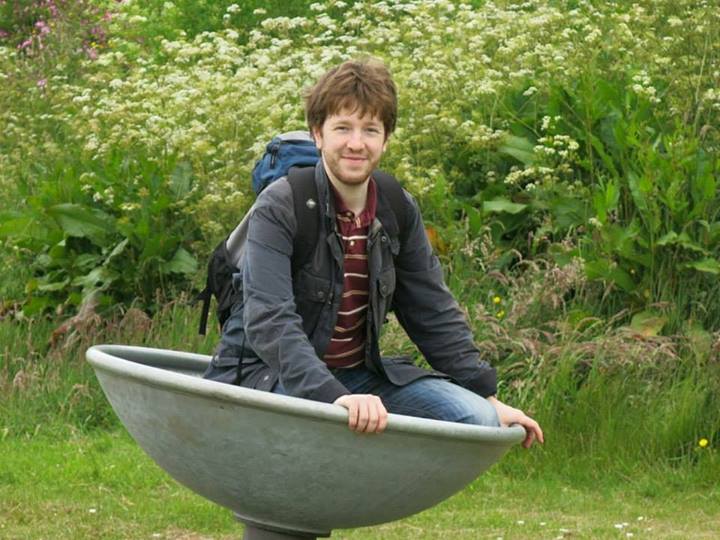
Paul: A poem might also be a cathedral. In your poem ‘Saint Bavo’ you describe its vastness ‘as ornate as a geode / the size of fifty quarries’. Where is this place?
Richie: It’s the cathedral in Ghent, which houses one of the cornerstone pieces of Western devotional art, ‘Het Lam Gods’ [The Adoration of the Lamb], the polyptych by the Van Eyck brothers. It’s well worth a visit, particularly for the medieval paint frescos in the crypt. My poems are definitely not cathedrals, they’re more on a tin tabernacle sort of scale I think.
Paul: Are you religious?
Richie: Oh dear, the one question I was dreading. My rational brain is always screaming atheist things – you have a body and each organ in that body is committed in a different way to keeping you alive, all you are is a consciousness, so once the body goes and the brain dies, there is surely nothing. The idea of a soul is manifest nonsense. However, I am also superstitious and pushed might admit to believing in ghosts. But even this could be rationalised as the desire to know there is something to the great beyond. To this day I can read Arthur Machen’s stories like ‘The Bowmen’ and be utterly chilled and thrilled by them, I so desperately want to believe in that sort of thing.
My father is undergoing a religious resurgence and he’s gone back to Roman Catholicism, but he says it’s all about the ‘aesthetic’. Maybe poetry and religion are often confused because they are both about finding an aesthetic, I really don’t know… I’m not religious in any organised sense, in fact I’m with Hugh MacDiarmid in believing that some of the most unchristian people in history have also been the self-proclaimed Christians. I believe in the sanctity of certain things, but money isn’t one of them. How’s that for avoiding the question? No. I’m not religious.
Paul: Another poem is called ‘Elizabeth Logan (1837-1839)’. Without repeating the poem, could you give a little insight into how it came about?
Richie: Interesting, but tragic story. Elizabeth Logan was the infant daughter of the stonemason, folklorist, writer and revolutionary geologist Hugh Miller. She died, I think of scarlet fever and her gravestone was the last that Hugh Miller made and carved. It has a scalloped edge to it and looks like an exquisite postage stamp, it’s in the old graveyard in Cromarty and I saw it during my two week residency there. In the poem I tried to show that while we love and care for our family, our own obsessions can get in the way and sometimes blind us to them.
Paul: John Glenday called you ‘sure-footed’, suggesting that each of your poems ‘traps significance like sunlight and reveals how we are connected to the world’. What do you think about this idea of the poem as a trap where we set it up, like a mousetrap with cheese, to try to harness something?
Richie: Neat idea. Poems are sometimes distilled essences of something or the other and I like the idea that a poet goes out like a lepidopterist with their net to bag something and that the poem as finished object can also capture the imagination of a reader if you’re very lucky. Recently my own poem gin has been rather empty – I seem to go through periods when I’m on the same wavelength as poems and other times when I’m deaf to them. Like Michael Longley says, if I knew where poems came from, I’d go there…
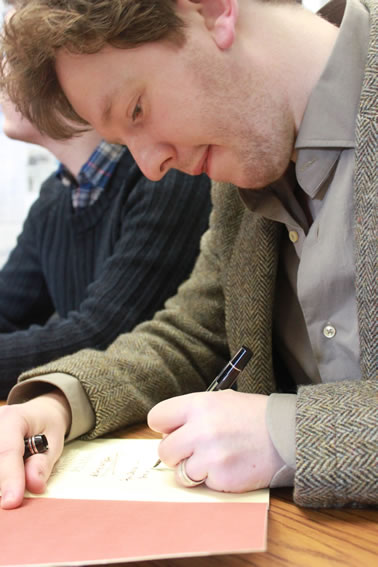
Paul: You are a master of the short poem, often with pieces of just 6, 8, 9 lines. How did you come to write short poems? What makes a short poem?
Richie: I find I’m writing longer poems these days, but for a long time I was obsessed with short poems as being the ultimate – the golden lyric and all that. I do think Ian Hamilton, who is the real short poem sensei here, was right to say that a short poem is a miraculous lyrical arrival – that’s to say, when a short poem works really well it’s like an ant and can move something ten times its size. For small poems the imagery really has to be striking and original and memorable and usually the emotions need to be on an operatic scale – an opera being sung in a hatchback car, that sort of thing. Not that mine do that – I’m saying the ideal ones do that – Hugh MacDiarmid’s lyrics of the 1920s, those sort of short poems.
Paul: You write largely in couplets and tercets, but also quatrains, cinquains. How important is form?
Richie: You might not like my answer to this. Form isn’t important to me at all, as long as it vaguely resembles a poem in my mind’s eye. And obviously my idea of a poem is couplets and tercets. I quite like the prose poems you get in Geoffrey Hill’s ‘Mercian Hymns’, but I’ve never been able to write that sort of thing myself. I’m also slightly put off technique for technique’s sake – villanelles and that sort of thing. But I’ve little time for the Charles Olson line ‘one loves only form’ – I certainly don’t!
Paul: There is a very distinctive voice to your poems. Who is speaking? Who are they speaking to?
Richie: Good point, it is always me speaking, I don’t think I’ve ever tried to channel anyone else’s voice in my poems, not even a character I’ve invented. I think it comes down to that ‘esprit de l’escalier’ thing – I am useless in spoken situations and poetry is my way of saying what I wanted to say that comes to me only after the event has passed. I’m glad you think my voice is distinctive because I know that’s a good thing and it takes a while to acquire. I couldn’t put my hand on what makes my style distinctive, someone would have to tell me. In the past I used to use lots of arcane words, but I’m less interested in that sort of thing now – it’s clarity I’m striving for.
Rory Watson said my voice was very ‘spiky’ and I quite like that. ‘Who are they speaking to?’ sounds like a line from a W S Graham poem – his work is all about that, the authorial voice and the listener – ‘what’s the language using us for?’ – this, although I’m mightily impressed by it – is much too clever for me. I suppose as a poet, I’m happy if my poems just speak to one other human being, because it’s ultimately about trying to bridge that gap isn’t it between one person’s thoughts and another person’s understanding of those thoughts.
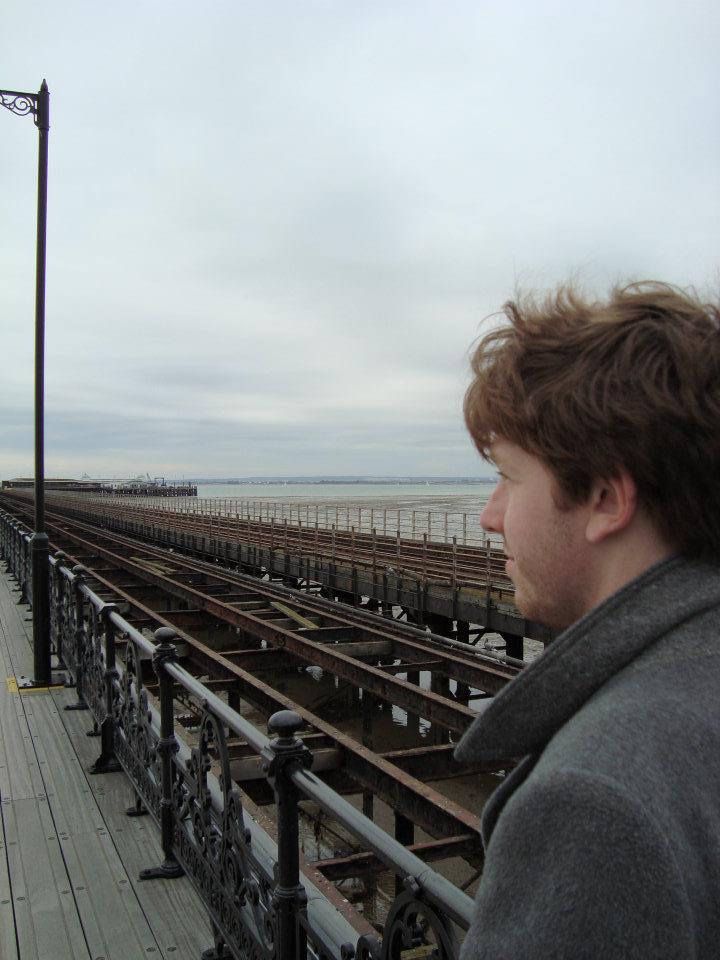
Paul: Do you think there is a distinctive way that you end your poems, or rather, that you have had enough with words? I feel they often come full circle, that you do something very satisfying with them at the end, but I can’t put my finger on it.
Richie: Helena Nelson has said my poems often run the risk of becoming puns and there’s definitely some truth in that – but I’m far from alone in doing this. I suppose I’m very wrapped up with this idea that a poem is a way of working through something and I do like poems that are presented as epiphanies. You can kill something by over-explanation and I’m sure I’m guilty of this. Perhaps I also seek a resolution when often there isn’t one to be had? I don’t know…
Paul: If your poems were paintings who would they be by? In which medium or style would they be painted?
Richie: Crikey, now that’s tough! I think the art and the poetry world are quite similar in a way – you have your self-appointed arbiters of taste in both and your trend-setters. What I most dislike about both is that there is clearly another party involved that is deciding who is important and valuable and who isn’t. At the moment I’m very interested in an Alnwick (Northumberland) artist who died recently called John Cartmel-Crossley. Have you ever heard of him? Of course you haven’t, but his watercolours are virtuosic and you can still pick them up for £30-50 a go. I have a few myself. I think the poetry world is like that too – there a few powerhouses who we have to respect and then there are the fringes and peripheries, which for me hold by far the most exciting talent. Maybe I’m a contrarian, but it’s like that Tom Duddy poem (I so wish I’d written it!) where his colleague points something out in a book and he finds himself instinctually looking at the other page first. As to style, I like art that is depictive but stylised and my favourite medium is watercolour, it’s pretty unforgiving but worth the effort.

PART THREE: POETRY LIFE
Paul: You spend a lot of time in Ghent. Do you have much contact with local poets?
Richie: I’ve had contact with the Poeziecentrum in Ghent and they got me to do some work for them for Versopolis, which was really kind of them. But no, I gather the poetry scene is quite insular and the main pre-requisite for entry is a good grasp of Flemish, which of course I don’t have!
Paul: You are widely read in Flemish and Dutch poetry. Who are your favourites and why? Who would you recommend?
Richie: I must stress: widely read in Flemish and Dutch poetry in translation into English. As I said above, of the Dutch poets Rutger Kopland really does it for me, and of the Flemish poets Herman de Coninck had such a knack with imagery. There’s a wealth of names and again it’s unfair to single some out, but I really like Eva Gerlach, Remco Campert, Leonard Nolens, Eddy Van Vliet, Robert Anker and Simon Vinkenoog for his sheer counter-culture energy.
Paul: Is there something distinctive about the way in which contemporary Dutch/Flemish poets write in terms of form and style?
Richie: There are, like in the poetry of any country, identifiable schools – the Pink Poets for instance. There’s all sorts, from fairly conventional lyricists to wild experimentalists like Paul Van Ostaijen whose work is proto-Modernist, Dadaist, Surrealist, Expressionist – Stef, my wife, is also a distant relation of his. I find that Dutch and Flemish poets are more unsqueamish and frank when it comes to issues of the body – there’s far more of a Villonesque earthiness there, but at the same time this is also twinned with an incredible heightened awareness of the European philosophical tradition, which is a rich seam for images and ideas. I often feel that the images many Dutch and Flemish poets use are more striking than those in the fairly narrow English Romantic canon of roses and deathbeds and daffodils and mountains.
Paul: What about the way the poets position themselves vis-à-vis society? And see their role as a poet?
Richie: Difficult question. The idea of the French poète-maudit is long gone but many poets are still clearly outsiders. In Belgium I’d say there is far less stigma attached to poetry – poets are genuinely respected, living and dead, whereas in the UK we only have time for the dead ones, and even then poetry is thought of as faintly embarrassing, juvenile and a bit pretentious. The difference between the days of Verlaine and now is the rise of the professional poet, the one who gets by in the poetry world, usually by teaching creative writing at university. These more successful, salaried poets are changing the image – they’re making poetry more central (if the university is to be thought of as the centre, I don’t necessarily think it is).
I do hold onto the romantic notion that the poet, in order to operate at their best, must be on the fringes of something, observing and taking notes. As I’ve said, once you start writing poems for adverts for nation-wide banks, alarm bells should ring. But I understand that we all have to get by, and I’m probably just being a bit of a snob, but poets in the past seemed to me to be holding the patriarchy to account, they were critics of the broken societies in which they worked.
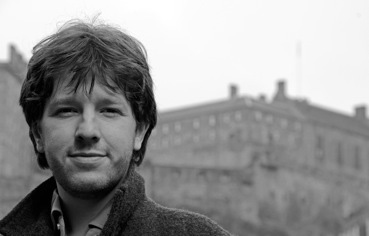
Paul: Do you have academic interests and projects in poetry?
Richie: Yes, I publish academic work relating to poetry quite often and I’ve a couple of projects on the go at the moment, one is an edited volume reappraising the neglected work of Scottish poet Sydney Goodsir Smith (1915-1975). I was very determined not to study creative writing at university, I was really more interested in criticism and academic writing relating to poetry.
Paul: You also write a lot of poetry reviews don’t you? I’ve seen your reviews at London Grip.
Richie: Yes, for a range of journals. I guess my review tally must be in three figures by now. I really enjoy reviewing, even if it is just for the book itself and one of the things I most enjoy (it rarely happens) is when a poet contacts you to say that they think you really ‘got’ their collection.
Paul: I understand you collect fountain pens. Could you tell me more? Which is your favourite?
Richie: I don’t collect them in any organised fashion – I am not out there trawling the antique shops and fairs for them, they tend to find me, and I’ve probably amassed about 50. Of those 50, I only have about 5 in regular use. At the moment I am using a green Sheaffer ‘Pen for Men’ (sexist name, I know, but it was made in the 1950s), a black 1970s Montblanc 146, a Namiki Falcon (a treasured gift from a true stylophile, Gerry Cambridge), a blue 1950s Parker Maxima Duofold, a modern taupe Pelikan M205 and my favourite pen of all, a 1980s matte black Sheaffer Targa with a broad italic nib. My Dad bought that one for me from a car boot sale, and it has the best nib of any pen I’ve ever tried. But I don’t write poems with that one, it’s strictly for letter writing.
Paul: Do you have nice handwriting?
Richie: I’m not the one to say. I yearn to have nice handwriting but I’m a leftie. The handwriting style I most wish I had would be something like that of Baron Corvo (Fr. Rolfe) – magnificent cursive, or else AJA Symons who was obsessed with Corvo and tried to emulate his handwriting (pretty successfully!). Edwin Morgan had beautiful handwriting, although he generally used a Cross biro. At school I was told my handwriting was awful and others have said my handwriting is pretty but illegible. Stef once posted a letter I’d addressed and the woman at the post office, on seeing the letter, exclaimed, ‘Oh my, what lovely handwriting!’ That rather made my day!
Paul: Is it true you don’t have a mobile phone?
Richie: 100% true. I used to have them and each one was smashed in a fit of rage – I was always pay-as-you-go and I kid you not, I’d put £20 credit on the phone and maybe make a couple of short phone calls, then try to make another only to be told ‘Sorry, you don’t have enough credit to make that call right now…’. My last phone ended up being shattered on the floor. Why don’t I have one? I’m going to sound like a grumpy old man here, but I hate that a phone means you are always contactable, I can only compare it to the old belief that God was omnipresent and always spying on you. Once you buy into technology, it has you, so you are always having to upgrade to something else. I see phone use as going hand-in-hand with laptops – you go into a café these days which is supposed to be a place of leisure and you see umpteen people working on their laptops. It’s all about breaking down the traditional boundaries of work – open plan offices, laptops and wifi to ensure people are always online, always working, mobile phones to chase them up. I just don’t like the lifestyle they point towards…
Paul: And that you once went to visit Edwin Morgan?
Richie: Only the once, at Clarence Court care home in Glasgow where he was for the last few years of his life. In 2008 (I think) I won a travel bursary from the Scottish Arts Council which had been funded by Edwin Morgan, so once I did my trip and wrote my poems, I decided to try and visit him. I had no idea how to go about it, so I merely made a list of care-homes in central Glasgow and decided to phone them. Luck must have been with me that day, because the first place I phoned was Clarence Court. I asked ‘do you have an Edwin Morgan staying with you?’ as if it was some sort of hotel! The woman at the other end replied ‘Oh, you mean Professor Morgan!’ I asked if I could pay him a visit and the woman on the phone checked with the Professor and he agreed and a week later or so I made my pilgrimage. Before I did so I phoned up to ask if I could bring a gift. I was told not to bring whisky, but instead orange juice.
So on the day, feeling a bit daft, I presented the Makar of Scotland with a bottle of orange juice which he accepted, but with a look which said ‘the nurses got to you, didn’t they?’. It’s only afterwards that I read of other people going to visit him, taking in much stronger stuff. But the disappointing orange juice didn’t derail the meeting. I remember him being bearded (he grew a beard because his anti-cancer medication made his blood very thin and if he cut himself shaving, it was a real nuisance) and clearly very old, very ill. He was still intellectually razor sharp – I brought along a copy of one of his pamphlet collections entitled ‘Demon’ and I bluffed as I asked him to sign it ‘It’s one of my favourites of yours’ – ‘Oh, a bit of a demon are we?’ was his reply. I was really just wasting his time, because at that point I didn’t really have a good knowledge or understanding of his work, but he suffered me with good grace. I wrote a poem about the visit which is in Cairn but I admit to being a bit embarrassed by the poem now – I refer to Edwin as ‘Eddie’ – a name only reserved for his friends, and I only met the man once.
Paul: Have you also met Douglas Dunn? (Your poem ‘Album’ in Cairn is dedicated to him).
Richie: There was no faffing about with orange juice when I visited Dunn at his home in Dairsie (in Fife) with Gerry Cambridge and Michael Pedersen. Dunn is something of a gastronome – he’s not a food snob but he likes to eat and drink well. I remember that day being very chatty, very convivial, and a little blurry towards the end. Wine with lunch and then onto malt whisky, but hearty portions of food to absorb some of the drink.
Paul: How important have Morgan’s and Dunn’s work been to you? Any favourite poems?
Richie: Well, I don’t think Edwin Morgan’s poems have had any impact on my own writing – he’s so protean as an artist and so keen not to be pigeonholed, you often come away from his work wondering who he is / was. His work is rejuvenating to read, but I’ve never felt like I’d wanted to write like him. His love poems for John Scott and his poem sequence ‘The New Divan’ are for me the crowning achievements of his oeuvre. Dunn, on the other hand, is a poet I love to read but a poet who also inspires a bit of envy in me – he’s much closer to the sort of poetry I’d like to write. I love the poems in ‘Terry Street’ (‘that man I wish him well / I wish him grass’) and of course his elegies for his first wife (of which Larkin said ‘you have gone far beyond me in suffering’). His elegies, while magnificent, are not to be envied, considering the immense suffering that inspired them. I’ve been following his recent work very keenly, but as a poet he’s much more formal than the poems I write.

Paul: You have a second collection appearing later this year. Can you tell me about the poems?
Richie: These poems have all been written in the last four years and the majority were written after I moved to Belgium in mid 2015. They are much more about home and what home is and how that changes conceptually and emotionally when your life becomes stretched over two countries. They are more centred on me and my life as opposed to the life of other, but I hope that doesn’t make them sound like self-indulgent soliloquies.
Paul: How did you arrive at the title and do about structuring the book?
Richie: The title is still not set in stone, but presuming it stays the way it is, it speaks of movement, of travel, of being in two places at once.
Paul: In what way does it build on ‘Cairn‘?
Richie: I think I’ve already explained this above. ‘Cairn’ was haunted in a different way to this new collection. In ‘Cairn’ I’d lost loved ones, but my sense of home was pretty unshaken, this collection is much more about dilemmas of love, of trying to start again in another country but always being torn between two cultures.
Paul: How do you feel you have evolved as a poet in the last five years, in terms of your approach to writing?
Richie: I have more of a sense of what I don’t want now, but I wish I had more ideas for poems, they are much sparser on the ground. My approach is very different – once upon a time poems would present themselves to me, now I never have an idea for a complete poem, I find that I think around a poem in terms of ideas and images, I jot them down and its only after going back through my notes I realise that a poem was forming and it’s in the redrafting that the poem is usually (not always) uncovered.
Paul: Which are your poetry go-tos – websites, journals, online resources?
Richie: Hard to say, because I flit around so much. Websites such as your own are important, and I like Matthew Stewart’s ‘Rogue Strands’ blog. Sites like ‘The Poetry Shed’ and ‘And Other Poems’ have been for me some of the most important online platforms. As for journals, really hard to say, but I’m biased, my favourite has to be Gerry Cambridge’s The Dark Horse – a beautifully made thing that is richly worth the subscription fee.
Paul: Will you stay in Belgium? Do you want to?
Richie: For now events are conspiring to keep us in both countries – UK and Belgium. Stef and I are quite convinced that we want to keep a presence in Belgium even if we increasingly find ourselves back in the UK. We’ll have to see where Brexit leaves us! Stef and I were staying in a guesthouse just recently and we were getting along really well with the landlady until over breakfast she dropped the clanger ‘I’m a Brexiteer’. She gave the usual reasons for her vote, taking back control and that the European Union is a vampiric bureaucratic behemoth and all that. She also said that her husband wasn’t from the UK, but they were ok because they held joint passports. Good for them, not so good for us! As an Englishman in Belgium, I have detected a certain froideur developing towards me and my passport since the Brexit vote, and I don’t think it’s fair that I should be associated with something to which I was so diametrically opposed. However, I don’t think I could live in Belgium all year round, I’d need to see my family at some point and I’d miss the Scottish and Northumbrian landscapes too much.
Paul: Where does the poem begin?
Richie: I wish I knew, please let me know if you find out. For me, there are poems that began years before I even wrote poems, and there are others I don’t know are coming. Is a poem ever finished or merely abandoned? That’s another of those brain teasers…
Paul: Is there a question I should have asked?
Richie: I think that might be enough for one day!
(credit: black and white portraits by Gerry Cambridge; others from the Scottish Poetry Library; you can contact Richie by email at: richiemccaffery [at] hotmail.co.uk)
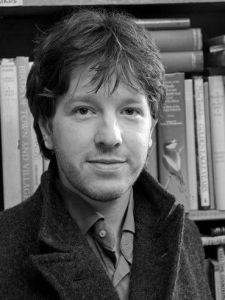

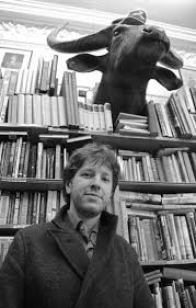










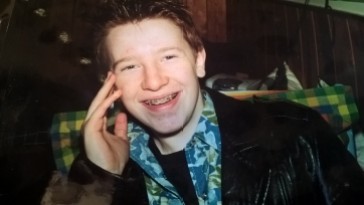


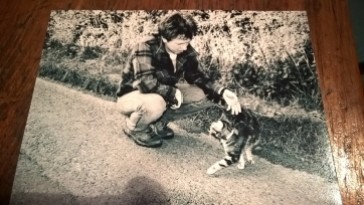













My goodness! This is very thorough and never less than fascinating. Good work both of you. This illuminated my Sunday morning on the grey Moray coast. MM